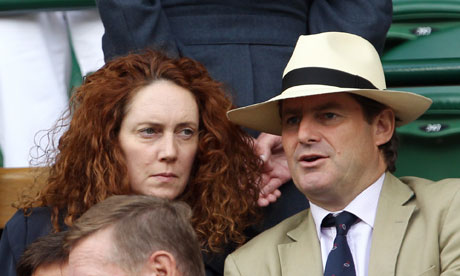
Buried in the torrent of revelations about News International is the interesting fact that Rebekah Brooks's husband, Charlie, runs a "kriotherapy" centre at Champneys, the spa that played a part in Sir Paul Stephenson's demise after revelations that he enjoyed a free five-week stay there [see footnote]. Is "kriotherapy" legitimate enough to be allowed out without its "scare quotes" on, or are the Brooks family backing another less-than-reputable product?
"Kriotherapy" is an innovative take on America's "cryotherapy", with a "k" instead of a "c" to make it sound cooler – like Krispy Kreme donuts, but marginally healthier. People take off most of their clothes, sit in front of a fan for a bit to dry their skin, and then lark about for a few minutes in a freezer set to more than a hundred degrees below zero. The treatments are offered by Champneys for fitness, body-sculpting, injury rehabilitation, and general wellbeing, with specific claims that it can help with depression, infertility, psoriasis and insomnia.
The treatment has had a huge amount of publicity in the press, with features in the Independent, Telegraph and FHM. Articles about it tend to follow a particular pattern: 1) reporter seeks treatment on the trail of a celebrity aficionado (Tony Blair, Jason Orange, Frank Bruno, you know the type), 2) reporter puts on silly outfit and feels a bit nervous, 3) reporter goes into the freezer and comes out feeling all tingly and invigorated, much as you would if you'd had a bucket of ice cold water tipped over your head.
So how is it supposed to work? FHM win the prize for the daftest explanation:
"When your skin senses the temperature, it sends an 'extreme danger' signal to your brain, initiating a fight or flight response. Your brain then performs a scan to check for areas of the body that might not be working to their fullest potential. With exercise, blood is then pumped around the body at a significantly increased rate."
Or in proper biological terms, "wibble". Champney's own explanation isn't much better:
"The treatment subjects you to extreme cold for a short period of time during which your blood capillaries limit circulation, pooling blood to your vital organs. As soon as you exit the chamber, your blood capillaries dilate to their maximum promoting a surge in blood circulation ... Kriotherapy awakens the body's healing response, stimulating circulation and immune response."
Like a Dan Brown novel, it sounds vaguely plausible, but falls apart the more you look at it. It's not clear how slowing down and speeding up your blood provides any benefit over just letting your blood move around normally; and the idea of "awakening" the "body's healing response", as if it has a tendency to doze off on the job, is a bit suspect. After a few hundred million years of evolution, your immune cells are pretty good at knowing what they should be doing, and when they should be doing it. The one thing that is known to produce short-term changes in immune function is just good old-fashioned exercise.
The evidence is unsurprisingly underwhelming. A pair of systematic reviews in 2004 by Hubbard and Denegar at Pennsylvania State University looked at more than 50 previous clinical trials of cryotherapy, and found that the quality of previous work was poor, and the evidence "limited", a pattern noted elsewhere. They noted that as of 2004, "no authors have assessed the efficacy of ice in the treatment of muscle contusions or strains. Considering that most injuries are muscle strains and contusions, this is a large void in the literature." The general gist is that it's not impossible the therapy may help athletes return to participation more quickly, but nobody seems very keen to find out.
Lack of evidence is unlikely to stop celebrities and lifestyle reporters endorsing dodgy products any time soon, but if you're tempted to give "kriotherapy" a try, ask yourself what you'd prefer to do, trust the clinical trials or hand over your cash to Rebekah Brooks's husband [see footnote]?
• This footnote was appended on 22 July 2011: This article stated that Charlie Brooks, the husband of former News International's chief executive Rebekah Brooks, "runs a 'kriotherapy' centre" at Champney's. To clarify: Brooks once worked with the owner of the centre when it was based in London and he also helped bring it to Champneys two years ago but since then he has had no connection with it.

